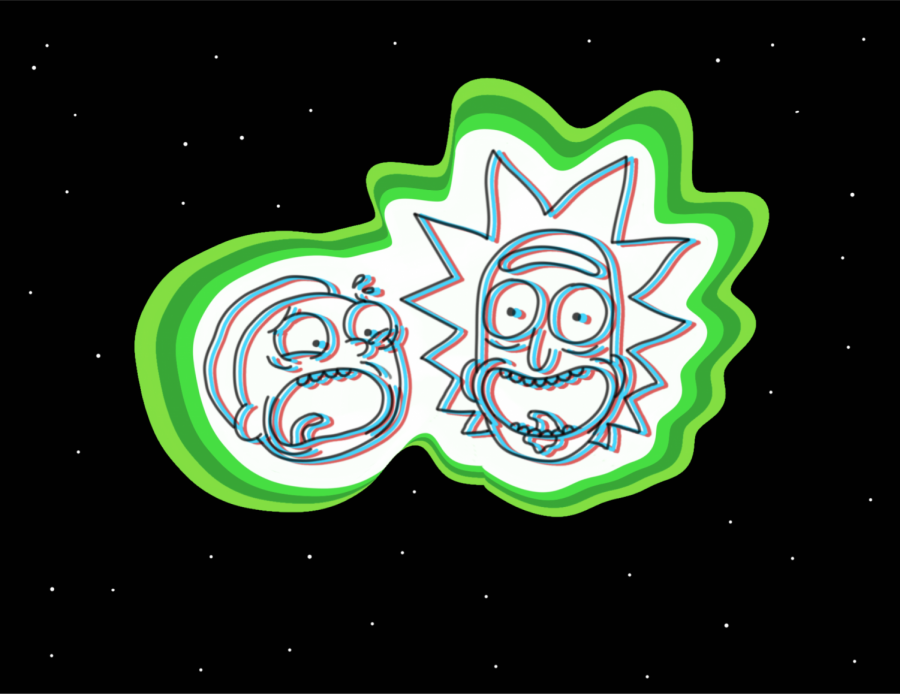Opinion | What ‘Rick and Morty’ can tell us about American masculinity
May 19, 2020
Warning: This column contains ample spoilers for all seasons of “Rick and Morty.”
The adult cartoon has been popular for generations. “The Simpsons,” “Family Guy,” “South Park,” “Archer” — animated shows have been analyzing the American family structure and gender for decades. As the popularity of “South Park” has calmed down, new shows have come to fill the gap it left behind — “Bob’s Burgers,” “Tuca and Bertie,” “Adventure Time” — you name it.
Out of all of these new cartoons of the 2000s, no show has had quite the interesting impact of “Rick and Morty.” Spawning an intense cult fandom, the show stars a genius male alcoholic as he deals with the big questions of life. Why am I here? Does my life have any meaning? Will I be punished for playing Machiavelli and abusing almost everyone in my life?
That last question is the kicker. When we consider the fan base of this show and its general reception, we can learn something about the modern male fan. In “Rick and Morty,” Rick rarely faces consequences for his actions, and his “might makes right” smugness seems to have traveled over to a subset of the show’s fan base — the subset who bullied the show’s female writers and went insane over dipping sauce. This type of misogynistic entitlement can have real-world consequences far worse than Reddit trolling — this behavior can become Gamergate, can become the world in which a man prone to tantrums is the president. The showrunners, Dan Harmon and Justin Roiland, have 70 episodes left. They should use them to change their philosophical tune.
Granted, it’s not just men who devour this show. Women and nonbinary people like this show too, of course — I’m one of them! But this show does have a male-leaning fan base, and that’s important to analyze. What draws so many men to it? I love “Rick and Morty.” I can’t lie. At best, the show is a profound exploration of what it means to be conscious on this giant orb about which we know nothing. At worst, as much as its writers fight against this, its cosmic nihilism glorifies abuse. Binging the show over quarantine, I instantly saw the issue with its reception — while there’s enough obvious information here to know that Rick is not a role model, there are unfortunately people who will not see that no matter how you spell it out for them.
And the show, perhaps unknowingly, allows this fan subset to do just that — place Rick as a role model, identify with him, see him and ergo themselves as gods. The issue lies in how “Rick and Morty” deals — or rather, doesn’t deal — with consequences.
I was surprised, watching the first season of “Rick and Morty,” to find that Rick physically and/or emotionally abuses Morty in every single episode. This continues up to where we are now, in Season 4.
Rick rarely faces consequences for his actions. He drags Morty near death on an episodic basis, verbally degrading him. He makes fun of his son-in-law every episode as well, throwing out savage one-liners like, “I don’t like your unemployed genes in my grandchildren” (“Total Rickall”). He doesn’t let his granddaughter, Summer, go on adventures with him until later into the first season because he doesn’t take “chicks” on adventures (“Raising Gazorpazorp”). His daughter Beth is an emotional wreck over the possibility of him leaving her again, leading us to believe he abandoned her as a child — by jumping through portals among galaxies, nonetheless.
This is one face of the modern father, the modern “genius” man who enraptures so many young fans. Here’s a man who faces no consequences, or rather, he can jump into another timeline to avoid them. Everyone he lives with is in some way or another at his whim. Isn’t this the perfect male fantasy for 2020? Or perhaps, isn’t this already part of our world? Where a man with power can get away with whatever the heck he wants, although in our reality it’s more Brett Kavanaugh and less causing the deaths of entire alien civilizations?
Rick is rarely reckoned with. It’s any incel’s wet dream, a compelling fantasy to young men who feel powerless in the wake of this new era. Rick is fantasy fulfillment.
The closest we get to a thoughtful look at any pain Rick may have is when Rick tries to commit suicide, but his drunkenness ironically saves him — he slumps over on his work bench, the death ray he set up missing his head by inches (“Auto Erotic Assimilation”). Moments like this are where the show is at its peak — here are the consequences of living the way Rick lives. We do not want to be him. We should want him to get better.
But these moments are few and far between. More often than not, Rick’s cosmic nihilist outlook wins. He does whatever he wants — because he has the ability to, and thus should be able to, goes his philosophy — and is lauded for it. Rick forces everyone to tell him what he wants to hear, to do exactly what he wants them to do.
In last Sunday’s episode, “The Vat of Acid Episode,” Rick creates a device that can stop and rewind time by branching all the stop points into alternate realities. He explains how the device works at the end of the episode, where Morty panics over all of the alternate Mortys who have died. Then, to add insult to injury, Rick proposes that Morty choose either to face all of the people he’s hurt in these alternate realities, or to give in to a bit Rick used at the start of the episode that Morty made fun of — Rick escapes from some antagonists by jumping into a vat of fake acid. Morty chooses to pretend-die in the vat of acid, foregoing responsibility. Like grandfather, like grandson. Rick never faces his actions and even pushes his family towards adopting this outlook.
I understand that once you put your art into the world, it belongs to your audience. But in the case of “Rick and Morty,” this show’s popularity gives it a responsibility to avoid creating more Ricks, more of the entitled man-child the show’s creators themselves loathe. This type of toxic masculinity breeds real-life violence and hate, breeds things like the entitlement of rape culture and mass shootings.This type of outlook, this bleak view of power, is shared by our current president — and we all know how well his models for running the world are going.
I’m not surprised that toxic fans are drawn to the outlook of “Rick and Morty.” The show prizes the exact type of behavior that causes the mocking of its fan base — the entitlement, the belief that being smarter or having more power means you should be able to do whatever you want. Until Rick’s character faces more obstacles, his avid fanboys will continue to believe he is God. They will continue to believe in Machiavelli, and adopt his ways in real time.
Telling your audience that might makes right and consequences are of no matter is intensely problematic. There are 70 episodes left, so there’s more than enough time to veer this show toward a better philosophy. As a fan, as a woman, I pray that Harmon and Roiland do as such.
Genna writes about culture, media and gender politics for The Pitt News. You can email her at gee9@pitt.edu.



